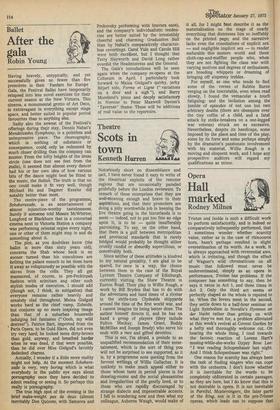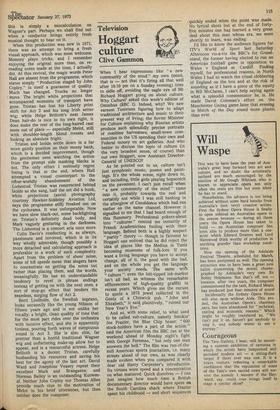Opera
Hall marked
Rodney Milnes
Tristan and Isolde is such a difficult work to perform satisfactorily, and is indeed so comparatively infrequently performed, that I sometimes wonder whether scarcity value, rather as in the case of rhinoceros horn, hasn't perhaps resulted in slight overestimation of its worth. As a work, it is always approached with reverential awe, which is irritating, and though the effect of Wagner's wild chromaticism on all music that followed must never be underestimated, simply as an opera in performance, Tristan has problems. If the composer has something to say, then he says it twice in Act 1, and three times in Act 2. Only the third act seems as perfectly shaped as the whole is reputed to be. When the lovers meet in the second, they settle down to a half-hour seminar on Light Symbolism in Novalis's Hymnen an der Nacht rather than getting on with what they've met for, a problem alleviated at this week's revival at Covent Garden by a hefty and thoroughly welcome cut. On hearing the whole thing, I tend towards the laconic reaction of Lorenz Hart's musing-while-she-works Gypsy Rose Lee: "I was reading Schopenhauer last night. And I think Schopenhauer was right."
One reason for scarcity has always been the task of finding singers who can cope with the orchestra. I don't know whether it is inevitable for the words to be completely obliterated in certain passages, as they are here, but I do know that this is not desirable in opera. It is not inevitable in Parsifal, Mastersingers, the later parts of the Ring, nor is it in the pre-Tristan operas, which leads one to suppose that this is simply a miscalculation on Wagner's part. Perhaps we shall find out when a conductor brings entirly fresh musical thought to bear on it.
When this production was new in 1971, there was an attempt to bring a fresh visual approach, which was most welcome. Memory plays tricks, and I remember enjoying the original more than, on rereading notes made at the time, I actually did. At this revival, the magic words Peter Hall are absent from the programme, which states simply "Production staged by John Copley," in itself a guarantee of quality. Much has changed. Trucks no longer move. The bright white projections that accompanied moments of transport have gone. Tristan has lost his Liberty print shift for Act 2 and his long Irish setter wig; while Helge Brilioth's neat James Dean hair-do is nice in •its own right, it does make the rest of the long-haired cast seem out of place — especially Melot, still with shoulder-length blond tresses and looking an absolute fright.
Tristan and Isolde settle down in a far more gainly position on their mossy bank, which is a decided improvement, though the gentleman seen watching the action from the prompt side masking blacks is not. The only effect I seriously regret losing is that at the end, where Hall attempted a visual counterpart to the ofher-worldly abandonment of the Liebestod. Tristan was resurrected behind Isolde as she sang, half the set did a bunk, while projections (aerial photography courtesy Hawker-Siddeley Aviation Ltd, says the programme still) freaked out on the cyclorama. It was unforgetable. Now we have slow black-out, some backlighting on Tristan's definitely dead body, and Mark vaguely gesturing in the darkness. The Liebestod is a concert aria once more.
Colin Davis's conducting is, as always, passionate and involved, which is in its way wholly admirable, though possibly a more detached and calculating approach is preferable in a work of such complexity. Apart from the problem of sheer noise, some of hi § speeds mean that singers have to concentrate on getting the notes out rather than placing them, and the words, meaningfully. He has an understandable tendency to revel in phrase endings instead of getting on with the next ones, a sort of stop-go effect that hinders the seamless, surging flow of Act 2.
Bent Lindholm, the Swedish soprano, looks uncannily like the young Nilsson of fifteen years ago and is not unlike her vocally: a bright, clean quality of tone that for the most part rides over the orchestra with incisive effect, and she is apparently tireless, pouring forth waves of sumptuous sound in Act 3. She is also slim, far prettier than a horrid traditional Wagner wig and unflattering make-up allow her to appear, and is a resourceful actress. Helge Brilioth is a decent Tristan, carefully husbanding his resources and saving his best for the agony of the last act. David Ward and Josephine Veasey repeat their excellent Mark and Brangaene, and Norman Bailey is an outstanding Kurwen al. Neither John Copley nor Thomas Allen provide much clue to the motivation of Melot in his brief utterances, but then neither does the composer.



































 Previous page
Previous page